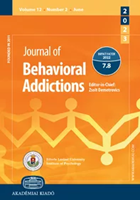Update on treatment studies for compulsive buying-shopping disorder: A systematic review
Update on treatment studies for compulsive buying-shopping disorder: A systematic review
Author(s): Astrid Müller, Nora M. Laskowski, Tobias A. Thomas, Stephanie Antons, Nadja Tahmassebi, Sabine Steins-Loeber, Matthias Brand, Ekaterini GeorgiadouSubject(s): Individual Psychology, Psychology of Self, Clinical psychology, Behaviorism, Health and medicine and law
Published by: Akadémiai Kiadó
Keywords: systematic review; compulsive buying-shopping disorder; online shopping; treatment; CONSORT; PRISMA;
Summary/Abstract: Compulsive buying-shopping disorder (CBSD) is mentioned as an example of other specified impulse control disorders in the ICD-11 coding tool, highlighting its clinical relevance and need for treatment. The aim of the present work was to provide a systematic update on treatment studies for CBSD, with a particular focus on online CBSD. Method: The preregistered systematic review (PROSPERO, CRD42021257379) was performed in accordance with the PRISMA 2020 statement. A literature search was conducted using the PubMed, Scopus, Web of Science and PsycInfo databases. Original research published between January 2000 and December 2022 was included. Risk of reporting bias was evaluated with the CONSORT guideline for randomized controlled trials. Effect sizes for primary CBSD outcomes were calculated. Results: Thirteen studies were included (psychotherapy: 2 open, 4 waitlist control design; medication: 2 open, 3 placebo-controlled, 2 open-label phase followed by a double-blind discontinuation phase; participants treatment/control 349/149). None of the studies addressed online CBSD. Psychotherapy studies suggest that group cognitive-behavioral therapy is effective in reducing CBSD symptoms. Pharmacological studies with selective serotonin re-uptake inhibitors or topiramate did not indicate superiority over placebo. Predictors of treatment outcome were rarely examined, mechanisms of change were not studied at all. Risk of reporting bias was high in most studies. Discussion: Poor methodological and low quality of reporting of included studies reduce the reliability of conclusions. There is a lack of studies targeting online CBSD. More high-quality treatment research is needed with more emphasis on the CBSD subtype and mechanisms of change.
Journal: Journal of Behavioral Addictions
- Issue Year: 12/2023
- Issue No: 3
- Page Range: 631-651
- Page Count: 21
- Language: English

